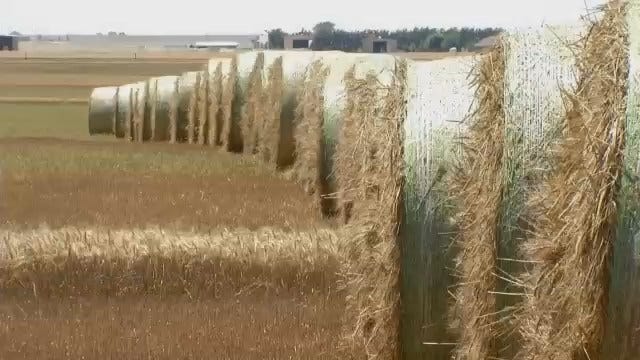Woods County Hopes Oil Success Offsets Failing Wheat Crop
Drought has bedeviled the state's wheat belt, and Woods County, but disaster in the fields is being tempered by a new bounty found beneath them, and changing their economy.Monday, July 7th 2014, 11:07 pm
If it doesn't rain, it doesn't grow. That sums up this year's Oklahoma wheat crop, as one of the smallest harvests in recent memory is just about in the books.
For three years now, drought has bedeviled the state's wheat belt, and Woods County is in the middle of it. It's also in the middle of a changing economy, where disaster in the fields is being tempered by a new bounty found beneath them.
With every sunrise, an Oklahoma farmer has a new chance at success, a hope that it will be the day when a bad year turns around; that in a dry year, the rain might come.
This year, however, every sunrise brought false hope. There was to be no rain; and so, in baked fields across the state, there was to be no wheat crop.
The OSU Extension Agent for Woods County, Greg Highfill, has a long memory stuffed with numbers; numbers that after three years of drought, have shriveled.
"This is without a doubt the most uniform poor wheat crop that we've had across the state in recent memory," he said.
It's played-out in enormous fields where the wheat has been baled for cattle feed, instead of harvested for bread. Now, a single strip of stunted plants stretches to the horizon, left to prove to insurance adjusters that the year was a bust.
In Woods County, 175,000 acres are planted in wheat in any given year. This year, only 100,000 acres made a crop, and the average bushel yield from those acres dropped from 33 to 18.
"And at $6.80 a bushel that's about a $20 million dollar loss that we've had here in Woods County," Highfill said.
The Leeper family's been growing wheat in Woods County for 103 years, and brothers Lee and Jay put their seed wheat in the ground in September with the same optimism they always muster.
"Any time you put the drill in the field you think this is going to be the best crop ever," the brothers said.
Except this year, it wasn't. It stopped raining when the seed went in the ground, cold winter winds blew, there wasn't much snow, so no snow-melt, and there was a late April freeze. By June, the Leeper's had lost 40 percent of their 5,000 acres.
"This is the worst it's been," they said.
They'll be saved from financial ruin by federal crop insurance, something the Dust Bowl farmers never had,
It's also not available to the staff at the Wheeler Brothers Elevator, towering over Alva. There, they keep a monitor open to the futures price coming from the Kansas City Board Of Trade. Family budgets ride the churn of pennies-per-bushel which was up 12 cents as we stood there.
"That's excellent, that's good news, we need it to get to $8 real fast especially with the lower bushels we're takin' in," they said.
During harvest, the trucks start pulling up to the scales out front in the early afternoon. During the two-week harvest rush, Wheeler Brothers stays open until midnight, or longer if need be, as farmer race the dew and the daylight for a pay day.
Their year's work measured by a scoop of kernels; rated for weight and moisture. Their paycheck is determined by the number spit out by the little machine.
Just six years ago, Woods County farmers brought in a bin-buster. The Wheeler Brothers elevators, filled to overflowing, with close to 3-million bushels of wheat.
However, as soon as they posted this year's Review-Courier article about Bob Pinnegar bringing in the first load of harvest on the last day of May, everyone sensed something was wrong.
The 94-year old Pinnegar told the paper the three-year drought was the worst he'd seen. That's why the Wheeler Brothers elevator will be filled this year to only a quarter of its capacity.
"The car dealer, the lumberyard, everybody will see, kind of, a down trend until we can get the next crop in the ground and get things to pick back up," said Wheeler Brothers Elevator Manager, Jake Kelln.
Except they likely won't. Alva's not just sitting in wheat country anymore, now it straddles oil country. Drilling now tempers the downturn of drought; it's a hopeful new economic order in a town that's plastered with tributes to what's always come from atop its fields, rather than below them.
Fields like those tended by the Leepers and families who don't have a choice but to try again next year. They've got too much invested there, even in years when so much of their work stands bent and blistered. In years like this one, when the promise of each new day dried up and blew away.
"If you get a hail, it's quick, it's done. But to see your work slowly wither and die is probably one of the, it's the toughest thing that we have to deal with," Lee Leeper said.
"We take great pride in seeing a nice field of wheat and it just hurts when you come up with something like this," Jay Leeper said.
The Leepers are among those farmers experimenting with growing canola on some fields now as an alternative to wheat.
The Wheat Commission said the state's harvest is about 95 percent complete.
Wet fields have slowed things in the Panhandle, where they're able to irrigate with water from the Ogalala Aquifer, which has its own problems as it's quickly being drawn down.
Still, because of that irrigation, harvests are approaching a hundred-bushels-an-acre in some fields east of Guymon.
More Like This
July 7th, 2014
April 15th, 2024
April 12th, 2024
March 14th, 2024
Top Headlines
April 23rd, 2024
April 23rd, 2024
April 23rd, 2024













